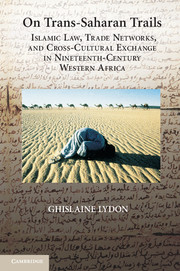 On Trans-Saharan Trails
On Trans-Saharan Trails Book contents
- Frontmatter
- Contents
- Acknowledgments
- Note on Language
- List of Abbreviations
- Glossary
- Maps
- 1 “Making History” Across the African Divide
- 2 Trans-Saharan Trade in the Longue Durée
- 3 Markets and the Movement of Caravans: Nineteenth-Century Developments
- 4 Guelmīm and the Wād Nūn Traders
- 5 The Organization of Caravan Trade
- 6 Business Practice and Legal Culture in a Paper Economy of Faith
- 7 Trade Networks and the Limits of Cooperative Behavior
- 8 On Trans-Saharan Trails
- Appendix 1 Nineteenth-Century Events
- Appendix 2 Pillaged Caravans Reported in the Chronicles
- Bibliography
- Index
6 - Business Practice and Legal Culture in a Paper Economy of Faith
Published online by Cambridge University Press: 02 July 2009
- Frontmatter
- Contents
- Acknowledgments
- Note on Language
- List of Abbreviations
- Glossary
- Maps
- 1 “Making History” Across the African Divide
- 2 Trans-Saharan Trade in the Longue Durée
- 3 Markets and the Movement of Caravans: Nineteenth-Century Developments
- 4 Guelmīm and the Wād Nūn Traders
- 5 The Organization of Caravan Trade
- 6 Business Practice and Legal Culture in a Paper Economy of Faith
- 7 Trade Networks and the Limits of Cooperative Behavior
- 8 On Trans-Saharan Trails
- Appendix 1 Nineteenth-Century Events
- Appendix 2 Pillaged Caravans Reported in the Chronicles
- Bibliography
- Index
Summary
Tel est le désert. Un Coran, qui n'est qu'une règle de jeu, en change le sable en Empire.
Antoine de Saint-ExupéryNow, honest (traders) are few. It is unavoidable that there should be cheating, tampering with the merchandise which may ruin it, and delay in payment which may ruin the profit, since (such delay) while it lasts prevents any activity that could bring profit. There will also be non-acknowledgement or denial of obligations, which may prove destructive to one's capital unless (the obligation) had been stated in writing and properly witnessed. The judiciary is of little use in this connection, since the law requires clear evidence.
Ibn KhaldūnIn the late nineteenth century a trader from Tīshīt entrusted merchandise, by way of an agency contract, to a caravaner traveling to the commercial center of Guelmīm in the Wād Nūn region. When he finally returned to Tīshīt after an absence of four years, the caravaner denied having been entrusted with some of the goods, and he declared that the qāḍī (judge) of Guelmīm had taken possession of one portion. As for the rest of the merchandise, he claimed that it got “lost along the way” (ḍāʿa fī al-ṭarīq). The original owner of the merchandise asked the qāḍī of Tīshīt to mediate the dispute, but he found no proof that the caravaner had lied to, or otherwise cheated, him. So he called on the services of a muftī (jurist), Muḥammad b. Ibraāhīm of the Awlād Bū al-Sibāʿ clan, who probably himself was from Wād Nūn, for the issuance of a fatwa.
- Type
- Chapter
- Information
- On Trans-Saharan TrailsIslamic Law, Trade Networks, and Cross-Cultural Exchange in Nineteenth-Century Western Africa, pp. 274 - 339Publisher: Cambridge University PressPrint publication year: 2009


